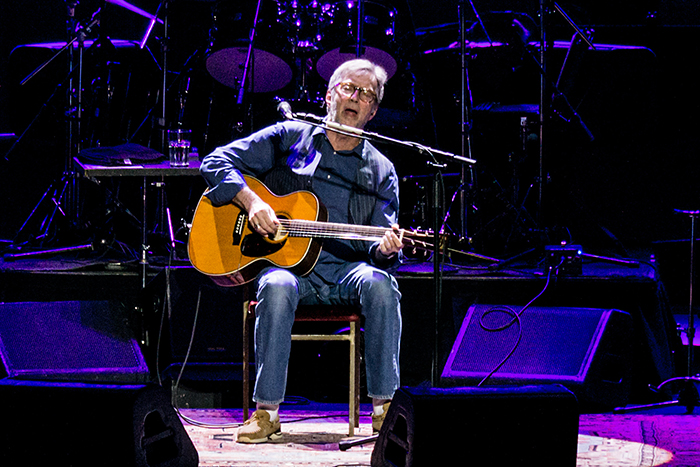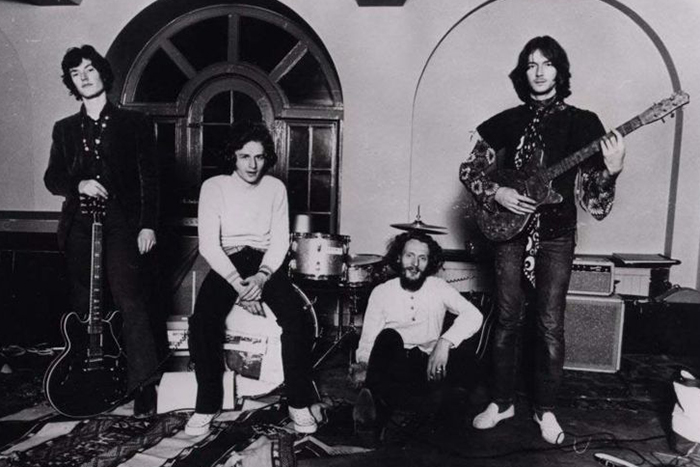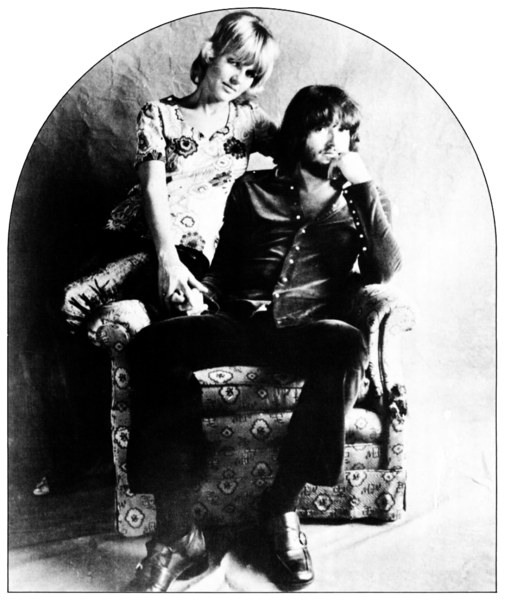ジェフ・ベックやジミー・ペイジと並ぶ世界3大ロック・ギタリストの一人、エリック・クラプトン(73)の来日公演が4月に予定されている。13日を皮切りに、20日までの5回、日本武道館で行われる。1974年の初来日以来、通算22回目、3年ぶりだ。
1991年、息子コナー(4歳)がニューヨークの高層マンションの窓から転落死したことから生まれたのが、名曲「ティアーズ・イン・ヘヴン」。ロック・ミュージシャンとして酒、女、ドラッグに溺(おぼ)れながらも、信仰を得て依存症から回復した軌跡をつづった『エリック・クラプトン自叙伝』(シンコーミュージック)が昨年末に刊行された(『エリック・クラプトン自伝』2008年の新装版。以下の引用は『自伝』から)。この「クリスチャニティー・トゥデイ」の記事は、2007年に原著が出版されたことに基づいている。(編集部)
誰が何と言おうと、エリック・クラプトンは良いところにいると言えるだろう。2008年2月、自身にとって19回目となるグラミー賞を受賞し(「ザ・ロード・トゥ・エスコンディード」で最優秀コンテンポラリー・ブルース・アルバム賞)、1969年に「ブラインド・フェイス」というバンドを組んでいたスティーブ・ウィンウッドとも活動を再開し、マディソン・スクエア・ガーデンで3日間の共演コンサートをして大絶賛された(「ライヴ・フロム・マディソン・スクエア・ガーデン」)。
[toggle]If testimony and evidence mean anything, Eric Clapton is in a good place. In February, he earned his 19th Grammy (for The Road to Escondido) and reunited with Blind Faith bandmate Steve Winwood for three widely acclaimed concerts at Madison Square Garden. The North Korean government invited Clapton to become the first rock musician to play the last bastion of true Communism; he has yet to decide whether to accept the invitation. [/toggle]
2017年、英国ロイヤル・アルバート・ホールで歌うエリック・クラプトン(写真:Raph_PH)
クラプトンは2007年、133日も続いたワールド・ツアーを終えてから、カリブ海のアンティグア島にある薬物治療施設「クロスローズ・センター」の基金を集めるため、自らが主催する第2回クロスローズ・ギター・フェスティバルを開催した。そして、『エリック・クラプトン自叙伝』を「ニューヨーク・タイムズ」紙のベストセラー・リスト入りさせたのだ。
[toggle]In 2007, Clapton completed a 133-date world tour, hosted the second Crossroads Guitar Festival to raise money for his substance abuse center in Antigua, and hit The New York Times bestseller list with Clapton: The Autobiography. [/toggle]クラプトンがメリア・マッケナリーと結婚して6年、夫婦の間には3人の幼い娘がいるが、彼女たちは、父親がトラブルだらけの過去を背負っているなどと想像もしていないだろう。
[toggle]He’s been happily married to Melia McEnery Clapton for six years, and they have three little girls who think the world of their daddy, without a thought for his troubled past. [/toggle]ギブソンのレスポール・モデルのギターを弾きこなし、熱狂的なファンが地下鉄の壁に「クラプトン(の演奏)は神だ」と落書きし、ブルース・ギタリストのマディ・ウォーターズに「自分の養子」と呼ばれて、その伝統を引き継ぐことを託された者にしては、最近のクラプトンはちょっと落ち着きすぎているように思われるかもしれない。しかし、彼の人生が順調だったのはほんの少しの期間だけだ。
[toggle]This all seems pretty sedate for the man whose work with a Gibson Les Paul led counterculture enthusiasts to declare on subway walls that “Clapton is God,” the man “adopted” by Muddy Waters and commissioned to carry on the legacy of the blues. But his road has seldom been smooth. [/toggle]9歳の時、母親と思っていたのが実は祖母で、実の母親はその娘であり、自分はカナダ軍人との間にできた私生児であることを知った時から、クラプトンは自分にとっての安全な場所を探し続けてきた。孤独と不安感は彼の人生につきまとい、ザラザラとした疎外感のあるブルースの世界へと彼を引き込んだ。
[toggle]From the age of 9 when he learned that he was born out of wedlock to his “auntie” and an unknown Canadian soldier, he struggled to find a safe place. Feelings of isolation and insecurity haunted him throughout life, drawing him to the gritty alienation of the blues. [/toggle]しかし、クラプトンに霊的な側面があることはあまり知られていない。彼の考えや行動、作曲して演奏してきた音楽にも影響を与えているにもかかわらず。
[toggle]But there is a spiritual side of Clapton that was scarcely known. It almost always influenced what he thought and did, and the kind of music he wrote and played. [/toggle]クラプトンは自分がクリスチャンであることを示したことはなく、信仰を持っていることもあまり口にしない。英国サリー州の農村で育ち、地元の国教会の集会に出席してはいたものの、「精神的なことには強い好奇心を持ちながら成長したが、わたしの探求は教会や地域での礼拝から私を引き離して、内面の旅に向けられていた」と自伝にはある(340頁)。彼の必要最低限の信仰は、少年時代に好きだった聖歌(673番)「わたしたちの小さな火」(Jesus Bids Us Shine)にも反映されている。
[toggle]Clapton never set himself up as a model of Christian faith, and admits as much. He grew up in rural Surrey attending a local congregation of the Church of England, and in his autobiography, wrote that he “grew up with a strong curiosity about spiritual matters, but my searching took me away from church and community worship to the internal journey.” The foundation of his minimalist faith is reflected in the favorite hymn of his youth, “Jesus Bids Us Shine”:[/toggle]イエス様は、清らかで純粋な光で照らすよう命じられます
[toggle]Jesus bids us shine with a clear, pure light,
夜に灯される小さなろうそくのように
この暗闇の世界で私たちは輝かなければなりません
あなたはあなたのまわりを照らし
私は私のまわりを照らします
Like a little candle burning in the night;
In this world of darkness, we must shine,
You in your small corner, and I in mine. [/toggle]
ここにあるように、私たちは自分の「まわり」で個人的に神に仕えるという暗黙の了解こそ、クラプトンが霊的な励ましをほとんど見いだせなかった労働者階級の地域社会では当たり前のことだった。
[toggle]That implicit recognition that we serve God individually — in our own “small corner” — made sense in a working-class neighborhood where Clapton found little spiritual encouragement. [/toggle]
ブラインド・フェイス、右がクラプトン(1969年)
1969年、クラプトンが結成したバンド「ブラインド・フェイス(盲信)」のツアーの前座をデラニーとボニー・ブラムメット夫妻が務めたが、クラプトンは彼らの本物のあたたかさに惹(ひ)かれていった。デラニーは、「地獄の業火(ごうか)を思わせるメッセージを伝える南部のバプティスト教会の牧師の役を見事にこなしていた。当惑することもあったが、歌った時の彼はまさに感動的」だとクラプトンは自叙伝で述べている(173頁)。
[toggle]By 1969 he was drawn to the genuine warmth of Delaney and Bonnie Bramlett, who opened for Blind Faith on their 1969 tour. Delaney’s “persona of a Southern Baptist preacher, delivering a fire and brimstone message … could have been off-putting,” observed Clapton, “if it wasn’t for the fact that when he sang, he was … absolutely inspiring.” [/toggle]ある夜、ブラムメットはクラプトンに「歌ったらどうだ」と勧めてきた。「せっかく神から与えられた才能なんだ。使わないと、取り上げられてしまうぞ」。クラプトンには自信がなかったが、このアドバイスに従った。
[toggle] One night, Bramlett challenged Clapton to start singing: “God has given you this gift, and if you don’t use it he will take it away.” Clapton, always unsure of himself, followed his advice. [/toggle]
デラニー&ボニー(1970年)
数日後、ショーの後でクリスチャンの観客がクラプトンの楽屋にやって来た。ブラインド・フェイスのツアーで最後に歌う「プレゼンス・オブ・ザ・ロード(主の臨在)」に魅せられたのだろう。若い信仰者たちにはこの曲が、「この聖なる神、主の御前に誰が立つことができようか」(サムエル上6:20)という御言葉にためらいながらも応答しているように思えたからだ。
[toggle]Just days later, two Christians came to Clapton’s dressing room after a show, probably drawn by the performance of “Presence of the Lord,” the showstopper on the Blind Faith tour. To young believers, the song seemed like a tentative response to 1 Samuel 6:20 — “Who can stand in the presence of the Lord, this Holy God?”: [/toggle]やっと生きていく場所を見つけた
[toggle]I have finally found a place to live
今まで知ることのできなかったところだ
差し出せるものなんてないけれど
扉を開けることぐらいならできる
誰もが秘密を知っている
誰もが真実を知っている
やっと生きていく場所を見つけた
主の臨在の中で
Just like I never could before
And I know I don’t have much to give
But soon I’ll open any door.
Everybody knows the secret,
Everybody knows the score.
I have finally found a place to live
In the presence of the Lord. [/toggle]
二人のクリスチャンはクラプトンに、「一緒に祈ってくれるように」と願った。彼らがひざまずくと、クラプトンは、「目もくらむような光」を見て神の臨在を感じた。彼の証しはオープンかつ正直に、自分が「ボーン・アゲイン・クリスチャンだ」と「誰にでも」伝えている。しかし彼の信仰の本質は、組織神学と照らし合わせてみると、迷信のようなものも帯びている。
[toggle]The two Christians asked Clapton to pray with them. As they knelt, he saw “a blinding light” and sensed God’s presence. His testimony was open and honest; he told “everyone” he was “a born-again Christian.” But the nature of his faith was tinged with a kind of superstition that would remain suspect in light of any systematic theology. [/toggle]クラプトンの伝説が大きくなるにつれ、彼の破壊的な行動も有名になった。信仰を持ったにもかかわらず、1年もしないうちにヘロイン中毒になり、それに打ち勝ったら、今度はアルコール中毒、性的乱交、そして数々のガールフレンドとの別れ。「悪い選択をしてしまうのが特技なんだ」と彼は言う。1987年、ついにどん底を味わう。1カ月に及ぶ薬物中毒からの回復に失敗し、ついに膝(ひざ)をかがめて神に降伏し、生まれたばかりの息子コナーに誓って「素面(しらふ)でいる」と約束した。
[toggle]As Clapton’s legend grew, so too did his destructive behaviors. Within a year of his conversion he became addicted to heroin, kicked it, but moved on to alcohol, sexual promiscuity, and a string of failed relationships. “Bad choices were my specialty,” he said. In 1987 he hit the bottom. Failing through a month of rehab, he fell to his knees and finally “surrendered” to God, dedicating his sobriety to his newborn son, Conor. [/toggle]4年後、コナーがパーク・アベニューの53階にあるマンションの窓から過って転落して死んだ頃は「信仰をなくしていた時期」だったとクラプトンは認めている。しかし、アルコール依存症から更正するための自助グループのミーティングに出席するだけの力を振り絞り、「自分の意思を神の手にゆだねた」。
[toggle]Four years later, when Conor died in a fall from the window of a 53rd floor of a Park Avenue apartment, Clapton admitted, “There was a moment when I did lose faith.” Still, he found the strength to present a session to his Alcoholics Anonymous meeting on “handing your will over to the care of God.” [/toggle]後に一人の女性が、「あなたは、私がお酒を飲む最後の口実を奪ってしまったわ」と感謝しに来た。クラプトンにとって「素面を維持し、他の人間が断酒に成功することを手助けすること」が、彼の人生において「ただひとつの最も重要な仕事」であることが立証されたのだ。
[toggle]Afterward, a woman confessed that he had taken away her “last excuse” for drinking, a confirmation to Clapton that “staying sober and helping others to achieve sobriety” is “the single most important proposition” in his life. [/toggle]この自叙伝の中でクラプトンは、自身の祈りの生活の始まりについて詳しく語っている。1987年の施設でのどん底の時を。
[toggle]In his autobiography, Clapton elaborates on the beginnings of his prayer life — that 1987 rock-bottom moment at the rehab treatment center. [/toggle]「私は完全に絶望して、怯(おび)えきっていた」とクラプトンは書いている。「私は誰もいない自分の部屋の中で助けを求めた。自分が誰に話しかけているかは考えなかった。我慢の限界に来たことがわかっていただけだ。……私は救いを求め、ひざまずいて降伏した。二、三日のうちに、自分に何かが起きたことに気づいた。……私は心のよりどころになる一つの場所を見つけていた。それはいつもそこにあることはわかっていても、実際には信じたいとも、信じることが必要だとも思っていなかった場所だった。その日から今日まで、毎朝、必ずひざまずき、救いを求めるために祈っている。夜には、自分の人生への、とりわけ禁酒したことへの感謝の気持ちを伝えている。ひざまずくことにしたのは、祈る時、謙虚な気持ちになる必要があると思っているからで、エゴの強い私にできるのはせいぜいそれくらいのことだ。なぜ私がこんなことをするのか聞きたいなら、教えよう……。要するに効き目があるからだ」(339~340頁)
[toggle]”I was in complete despair,” Clapton wrote. “In the privacy of my room, I begged for help. I had no notion who I thought I was talking to, I just knew that I had come to the end of my tether … and, getting down on my knees, I surrendered. Within a few days I realized that … I had found a place to turn to, a place I’d always known was there but never really wanted, or needed, to believe in. From that day until this, I have never failed to pray in the morning, on my knees, asking for help, and at night, to express gratitude for my life and, most of all, for my sobriety. I choose to kneel because I feel I need to humble myself when I pray, and with my ego, this is the most I can do. If you are asking why I do all this, I will tell you … because it works, as simple as that.” [/toggle]執筆者のジョン・パウエルはオクラホマ・バプテスト大学の歴史学の助教授。
本記事は「クリスチャニティー・トゥデイ」(米国)より翻訳、転載しました。翻訳にあたって、多少の省略をしています。
出典URL:https://www.christianitytoday.com/ct/2008/aprilweb-only/115-32.0.html
